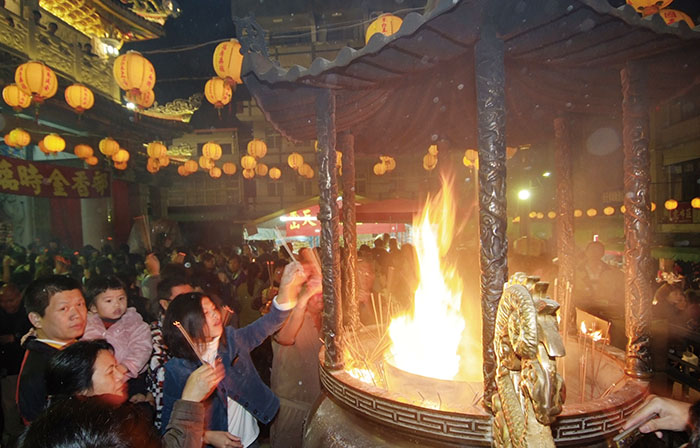Grandma Wang Guo Jin-hua's Lunar New Year's Celebrations and Traditions/阿嬤們的高雄新年 王郭錦華─褪赤腳的趣味新年
Grandma Wang Guo Jin-hua's Lunar New Year's Celebrations and Traditions
◎English translation: Hou Ya-ting ◎Photo by Pao Chung-hui
Fosngshan native, Grandma Wang Guo Jin-hua was born in 1932. Even though, she grew up in a time when people didn't have much money, she felt her childhood was still so much fun and full of joy and laughter. Although, life was tough in those days and children had to bear a lot of responsibility, they still enjoyed life's simple pleasures and enjoyed the time they had to hang out with their friends.
When Grandma was young, schools did not have uniforms. Students wore causal clothes, as they were had to go out to work in the fields afterwards. Students would carry their books in canvas bags over their shoulders. Most students didn't even have shoes, so they went to school barefoot. When students returned home from school, they would drop off their book-bags and rush out to the fields to find river snails. During the sweet potatoes harvest, students would line up behind the farmers to pick up those that were too small. They would later be dried and shredded or cooked with rice. Whenever Grandma Wang Guo heard the neighbors were going to flood the fields, she and her younger siblings would rush out to catch fish.
For 58 years, she owned and ran a grocery store on Shuangcih Street. Several years ago, she handed the business over to her son. However, she often goes to the shop in the afternoon to pack millet and measure out mung beans for clients. "Working everyday maintains my health," states 84 year old energetic grandma, who seems to have defied aging. Her unbreakable bond with her shop is exemplified in her devotion to her work. With her distinct warm character, her clients always enjoy seeing her.
 When asked about the Lunar New Year, a big smile appears on Grandma Wang Guo's face. "The Lunar New Year feast is always more bountiful than the usual meals we have," she explains. Preparation begins a week before. Classic customs included preparing the Lunar New Year's feast and the offering table to worship the gods. They would also hang couplets written on strips of red paper on the front doors of their homes and receive red envelopes from grown-up.
When asked about the Lunar New Year, a big smile appears on Grandma Wang Guo's face. "The Lunar New Year feast is always more bountiful than the usual meals we have," she explains. Preparation begins a week before. Classic customs included preparing the Lunar New Year's feast and the offering table to worship the gods. They would also hang couplets written on strips of red paper on the front doors of their homes and receive red envelopes from grown-up.
When Grandma Wang Guo was young the currency of the time was the Tsiam. Whenever she wanted candies, she would ask her grandma for one Tsiam, which would buy two candies. Red envelopes would contain five Tsiam which would purchase 10 candies that would last her for half a month. Another family tradition included the children waking up early and going to pray in Fongshan Shrine from five to six o'clock on the first day of Lunar New Year.
On the second day of Lunar New Year, families would visit the mother's family home. Grandma Wang Guo remembers there would always be a house full of people, with elders and children around table. The holiday atmosphere, the delicious smell of dishes and holiday spirit bring back special memories for her. Grandma Wang Guo also enjoyed the week-long vacation that came with the New Year and not having to do to any chores. For children it was great to be able to relax during the New Year.
Although life was difficult in those days, they were still happy times. For Grandma Wang Guo, Lunar New Year was the best time of all. Filled with tradition and surrounded by family, she still looks back on it with fond memories. A resilient and hardworking Grandmother, she is continues to be a gem of Fongshan.
阿嬤們的高雄新年 王郭錦華─褪赤腳的趣味新年
◎文/周書正 ◎攝影/鮑忠暉
一九三二年出生的王郭阿嬤是鳳山人,在雙慈街開雜貨店開了五十八年,雖然已經交棒給兒子好多年了,但還是每天下午要到雜貨店裡替老顧客們包一、兩斤小米、綠豆。「有在做工課,身體會比較好」她笑著對我說,聲音清澈而且充滿元氣。
說起兒時的新年印象,王郭阿嬤覺得那跟當時無憂無慮的生活是很難切割的。那時候學校沒有統一的制服,學生們都穿著方便下田工作的衣服上課;沒有書包,就拿大一點的布包著兩本書揹上肩;沒有鞋,每個人都光著腳丫子去學校。放學回家之後把書包往家裡一丟,褪赤腳就下田裡釣田螺去了。如果剛好趕上別人的蕃薯田在收成,就跟在採收的隊伍後面撿瘦小的、被挑漏的蕃薯回家給母親做蕃薯簽。聽到鄰居的田裡面在喊著要放田水,就拉了妹妹帶著篩子去撈魚。
「當小孩多有趣喔」王郭阿嬤手舞足蹈地說。
但仔細去理解王郭阿嬤所說的無憂無慮的生活,會發現那其實是在艱苦的歷史背景中,孩子們獨有的尋找快樂的方式。釣田螺、撿蕃薯、撈魚,看似是無憂無慮的農家樂,但背後其實有著「不這樣做吃不飽」的憂慮在。
「那過年的時候呢?」聽我問起了過年,王郭阿嬤又笑了。
「過年當然有比較豐富,我們都是從二十五、二十六號一路忙到除夕夜,到了除夕就要準備團圓飯、準備拜拜、貼春聯,吃飽了就等著跟大人們討紅包。 」
她說那個時候最常用到的幣值是「尖(tsiam)」,討錢的時候就是纏著阿嬤「予我一尖啦!予我一尖啦!」地喊。好不容易討到了一尖,就可以拿去買兩顆糖球慢慢吃。過年的紅包差不多都包五尖左右,買十顆糖球可以吃大半個月呢!
到了大年初一,不管前一天多晚睡,小孩們大概五、六點就會自動起床到鳳山神社去參拜。
「那初二的時候呢?」
「初二我們都講是『女兒日』嘛,大家都回到家裡面來,十幾個人坐一大桌,大家熱熱鬧鬧的吃飯,過年的時候最熱鬧的就是初二之後。那時候過年我們都會放一個禮拜的假,大人們就放孩子們自己去玩,過年最開心的就是大人只有這段期間不會叫我們做東做西的。」
在訪問結束之後,我跟著阿嬤到了她在雙慈街的雜貨店替她拍幾張照片。看她帶著笑容熟練地秤綠豆、包小米,我才明白原來阿嬤的幸福一直都跟勞動結合在一起,只要她還能在雜貨店裡替鄰近的老主顧們包一袋五榖雜糧,她與土地的連結、她的幸福就還會持續下去。她的笑聲也會繼續向我們訴說,她艱苦卻趣味的童年記憶。